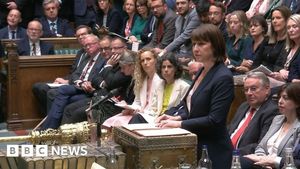Donald Trump's recent election victory is already sending ripples through various sectors, especially with influential billionaires like Elon Musk standing at the forefront. The world’s richest man, who has openly supported Trump, wasted no time celebrating his win and preparing for the implications of this political shift on his vast business empire.
On election night, as results poured in, Musk shared his excitement over Trump's victory, tweeting, "The people of America gave @realDonaldTrump a crystal clear mandate for change tonight." That night, Musk was alongside Trump at Mar-a-Lago, and during Trump's victory speech, he lavished praise on Musk, particularly highlighting the impressive work of Musk’s rocket company, SpaceX, and its innovative Starlink satellite internet service.
Musk’s backing of Trump has been substantial, amounting to over $130 million and substantial social media campaigning aimed at bolstering Trump’s popularity. This financial commitment paid off, as Trump is now positioned to influence policies more favorably toward Musk's businesses.
Trump's presidency heralds potential regulatory changes benefiting Musk’s substantial investments. Musk's relationship with the ex-President could lead to looser regulations on companies like SpaceX and Tesla, which have had to navigate complex governmental oversight. Government contracts, which have fueled Musk’s ventures, could be at stake too. According to The New York Times, SpaceX and Tesla have accumulated around $15.4 billion from government contracts over the past decade, making their relationship with the federal government especially pivotal.
One notable area where Musk could see change is with SpaceX. Currently facing scrutiny from the Federal Aviation Administration (FAA) due to serious safety concerns and hefty fines, Musk has suggested the establishment of the Department of Government Efficiency (DOGE) under Trump—an entity he asserts would alleviate burdensome regulations on aerospace firms, particularly SpaceX.
For SpaceX’s internet service, Starlink, the prospect of smoother negotiations with the Federal Communications Commission (FCC) looms. Trump’s potential administration might see the reappointment of favorable regulators, such as Republican commissioner Brendan Carr, who has publicly criticized past FCC decisions as “regulatory harassment.” Trump's long-held view of utilizing Starlink for improving rural connectivity also aligns with Starlink's goals and could open doors for lucrative government contracts.
Then there's Musk’s other high-profile acquisition, the social media platform X (formerly known as Twitter). Under Musk, X has faced challenges, including investigations by the Federal Trade Commission (FTC) for failing to adhere to privacy agreements. Musk's claim of political retribution suggests he anticipates favorable outcomes for X under a Trump administration, especially with Trump vowing to replace current FTC leadership.
Musk's ventures don't stop at social media or aerospace; xAI, his artificial intelligence company, stands ready for potential policy shifts as well. Despite the lack of comprehensive guidelines for AI at the federal level, Musk could advocate for less stringent frameworks under Trump, differentiable from the current administration’s stricter regulations. He’s also ventured passionately within the AI ethics debate, backing legislation to impose safety measures on large AI companies, pacifying investors concerned about the industry's rapid growth.
Within the automotive sector, Musk's Tesla has been under investigation due to safety failures related to its Full Self-Driving technology. Here, Trump's administration might aid Musk by allowing him to influence federal safety regulations, potentially expediting oversight for autonomous vehicle technologies which Tesla is desperate to introduce to the marketplace. This aligns neatly with Trump’s stated aim of reducing the regulatory burden on American businesses.
Through his other firms, such as the Boring Company, Musk seeks to mitigate the frustrations tied to expansive infrastructure projects, often delayed due to governmental oversight. If Trump’s presidency fosters more government partnerships, it could simplify the pathway for ambitious transit projects like Musk's Hyperloop.
An equally ambitious player is Neuralink, Musk’s brain-computer interface company. Trump's administration may present Musk with more lenient pathways for the FDA approval processes he has relentlessly criticized. Musk has openly declared the obstacles from lengthy approval processes have detrimental impact on innovation necessary to save lives.
It's also important to mention Musk’s venture capital approach with super PACs backing Trump, pointing to his eagerness to see substantial returns from his financial contributions. Early projections estimate financial benefits for Musk across his firms, from favorable federal contracts, reduced regulations, to swift FDA approvals—an outcome many are now watching closely.
Public sentiment, reflected through stock market movements, hints at investor optimism post-election. Following Trump's speech, Tesla stock surged by 15% as optimism surged around Musk’s business prospects. Traders are now contemplating the long-term impacts of these relationships and Trump's broader policy directions.
The recent election has left many anticipating whether Trump's second tenure will benefit or challenge Musk and his ambitious goals. For Musk, the stakes couldn’t be higher, and it seems he’s poised to leverage every opportunity to maximize this new political alignment. The question remains—what will be the long-term impact of this alliance under the Trump presidency for Musk and for American industry?
With Musk deeply intertwined politically and financially with Trump’s presidency, it’s clear this collaboration will be one to watch as it could shape various industries for years to come. How these plans will materialize, whether Musk will reap the rewards of his investment, and the consequences for regulatory practice across the country is still playing out, but both Musk and Trump are set for what may become one of the most analyzed relationships between business and politics.
Whether critics see this collaboration as ethical or not, one thing is certain: the interplay between Musk’s mega-corporations and governmental influence is only just beginning to unfurl, casting shadows across political, technological, and economic landscapes.



